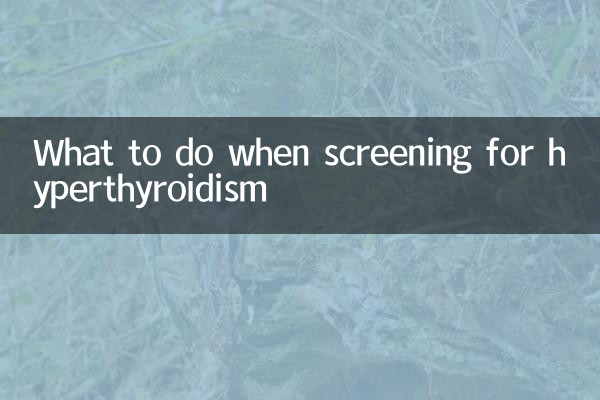What to do when screening for hyperthyroidism
In recent years, the incidence of hyperthyroidism (hyperthyroidism) has increased year by year, becoming one of the health hotspots of public concern. Hyperthyroidism is a metabolic disease caused by excessive secretion of thyroid hormone. If not diagnosed and treated in time, it may cause damage to multiple systems such as cardiovascular and skeletal systems. This article will introduce in detail the specific items and precautions for hyperthyroidism screening to help you better understand the early detection and management of this disease.
1. Common symptoms of hyperthyroidism

The clinical manifestations of hyperthyroidism are diverse. The following are some typical symptoms:
| Symptom Category | Specific performance |
|---|---|
| Hypermetabolism | Afraid of heat, excessive sweating, weight loss, and increased appetite |
| nervous system | Easily agitated, irritable, insomnia, hand tremors |
| cardiovascular system | Palpitations, tachycardia, arrhythmia |
| Eye symptoms | Protosis, eyelid edema, decreased vision (Graves' ophthalmopathy) |
| other | Menstrual disorders, muscle weakness, thyroid enlargement |
2. Core examination items for hyperthyroidism screening
If the above symptoms occur, it is recommended to seek medical treatment in time for professional screening. The following are the main examination items for the diagnosis of hyperthyroidism:
| Check items | clinical significance | reference range |
|---|---|---|
| Serum TSH | The most sensitive indicator, usually lowered in hyperthyroidism | 0.27-4.2 mIU/L |
| Free T3 (FT3) | Directly reflects thyroid hormone activity | 2.8-7.1 pmol/L |
| Free T4 (FT4) | Assess thyroid hormone secretion status | 12-22 pmol/L |
| Thyroid antibodies | Identify autoimmune hyperthyroidism (such as TRAb, TPOAb) | Negative or below critical value |
| Thyroid ultrasound | Observe thyroid morphology, blood flow and nodules | no special description |
| Thyroid iodine uptake rate | Identifying hyperthyroidism caused by thyroiditis | 24-hour intake rate 5-25% |
3. Precautions for screening
1.Preparation before inspection: For some tests (such as iodine uptake rate), iodine-containing foods or drugs need to be stopped in advance; strenuous exercise should be avoided before blood drawing.
2.Time selection: Thyroid hormone levels fluctuate day and night, so it is recommended to test at 8-10 a.m.
3.Special groups: Pregnant women need to focus on monitoring FT4 rather than TSH; the elderly may show apathetic hyperthyroidism with atypical symptoms.
4.Interpretation of results: Abnormal diagnosis cannot be made by a single indicator, and a comprehensive judgment must be made based on clinical manifestations and other examinations.
4. Hot topics: Why is hyperthyroidism screening attracting attention?
Recent data shows that thyroid disease is on the rise globally. The following is relevant hot data in the past 10 days:
| hot topics | attention index | associated factors |
|---|---|---|
| Thyroid health in the workplace | 856,000 | Stress, staying up late and other triggers |
| Pre-pregnancy thyroid screening | 723,000 | Popular science on maternal and infant health |
| Iodine intake controversy | 689,000 | Salt iodization policy discussion |
| AI-assisted diagnostic technology | 532,000 | Medical technology innovation |
5. Prevention and suggestions
1. High-risk groups (those with family history, women, and over 40 years old) are recommended to screen their thyroid function every year.
2. Maintain a regular schedule to avoid long-term mental stress.
3. Eat iodine-containing foods reasonably, and residents in coastal areas should pay attention to controlling their seafood intake.
4. Seek medical attention promptly when suspicious symptoms occur, and avoid taking health care products containing thyroid hormone by yourself.
Through scientific screening and early intervention, the vast majority of patients with hyperthyroidism can achieve a good prognosis. It is recommended that the public pay more attention to thyroid health and achieve early detection, diagnosis and treatment.

check the details

check the details